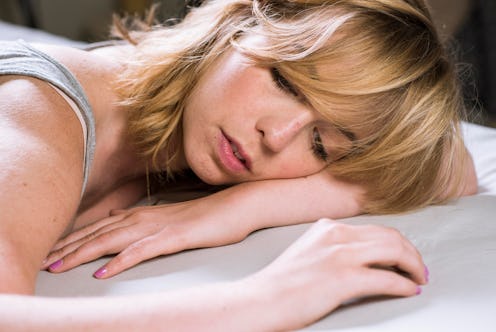
Once you start adulting, getting a good night's sleep feels right up there with winning the lottery. Most days, though, you're probably hitting snooze once or twice (or five or six times) to try to maximize the amount of rest you're getting before you start the day. However, scientists say that the cliché "if you snooze, you lose" is actually true. Seriously: Hitting the snooze button can ruin your day, but the good news is that there are some expert-approved ways to stop snoozing and actually rest well.
Matthew Walker, professor of Neuroscience and Psychology at the University of California, Berkeley, and founder and director of the Center for Human Sleep Science, writing for the Daily Mail, says that any time you wake up in an unnatural way, i.e. with an alarm, your body goes into fight or flight mode, which causes your heart to speed up. "Using the snooze feature means you will repeatedly inflict that cardiovascular assault again and again within a short span of time," Walker explained. "Repeating this at least five days a week in your working life, can cause multiplicative abuse to your heart and nervous system."
If the news that your alarm clock is plotting your demise isn't upsetting enough, hitting the snooze button can plunge you into another sleep cycle. While this might sound appealing, it's actually why you might be acting like a toddler in the morning. When you're sleeping, your brain goes through roughly five 90-minute cycles, according to Psychology Today, and that extra nine minutes you gain by snoozing can rob you of a good part of your day because it's pulling you out of the first stage of sleep. This is why you often feel more tired after snoozing than you would if you had just gotten up right away.
However, there is some conflicting information about snoozing. Curious Mind magazine reported that another study published in the journal Personality and Individual Differences found that snoozers are actually more creative and more intelligent. Before the Industrial Revolution, most people tended to go to bed at sunset and rise at dawn. The study noted that only people with a high IQ can not only overcome this predisposition and keep snoozing, they actually might be better off for it. But IMO, I think they're probably still tired, and perhaps all of that extra creativity comes from being delirious from lack of sleep.
If lack of sleep ins't helping you write the next great American novel, here's how to stop hitting the snooze button to rid yourself of the morning crankies. One of the easiest ways to stop snoozing is to make sure you put your alarm, or phone, far away from your bed so you actually have to get up to turn it off. Once you're already upright you're more likely to stay that way, according to the National Sleep Foundation.
For most of us, being thrust abruptly from our sweet sleep can lead to getting up on the wrong side of the bed. Worry not, my friendlies, because there's an alarm clock for that. This type of alarm clock helps wake you up naturally by mimicking the sunrise, which is how your body wants to wake up. If you're worried that you'll just put a pillow over your bed and ignore the light, it doesn't let you. The punishment for not getting up with the "sun" is a noisy alarm that activates after a certain amount of time. It's pretty loud so you'll likely get up just to avoid the horrible noise.
The National Sleep Foundation also notes that many activity trackers come with a feature that vibrates to wake you up slowly. Another way to get out of bed without hitting snooze is to get a coffee brewer with an automatic timer. Set it for 10-15 minutes before your alarm is supposed to go off. This way when you wake up, you'll literally smell the coffee and be less likely to push the bad button.
However, all of the coffee and sunrise alarm clocks aren't going to work if you're not getting enough sleep in the first place. Most experts recommend at least seven to nine hours of sleep per night for adults. You can also practice clean sleeping, which is a routine designed to help you get more shut eye and feel more refreshed in the morning.
This Goop-approved sleep trend is actually just common sense. It includes things like powering down your devices a few hours before you go to bed, allowing enough time for restorative sleep, giving yourself a pre-bedtime massage, curbing afternoon caffeine, and going to bed at the same time every night. Basically, the more you set yourself up for success when you go to bed, the less likely you'll be to reach for the snooze button. Try it for 30 days and see if you feel better in the morning. Because, an extra nine minutes of sack time isn't worth ruining your entire day.